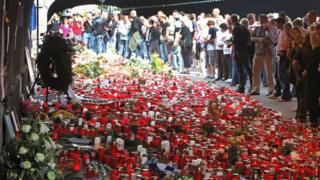 Image copyright
Image copyright
Getty Images
Twenty-one people died after thousands tried to access the festival via this tunnel
The organisers of the “Love Parade” festival will stand trial in connection with the deaths of 21 people in a crush in 2010, a German court has ruled.
More than 500 others were injured in the crush, when thousands tried to squeeze through a tunnel that served as the only access to the music festival.
Ten people will now face charges of manslaughter and negligence for the disaster in Duisburg.
A Duesseldorf court overturned the previous decision to drop the case.
The court said the case could be “proven with sufficient probability”, based on the available evidence.
Four event organisers and six municipal employees will be tried in the western city of Duisburg, where the techno event took place seven years ago.
In a statement, the regional appeals court said the results of an investigation suggested that “breaches of the duty of care with which the accused are charged were the cause of the deaths and injuries.”
Poor design of the entry way and flow capacity for revellers caused the disaster, “and could have been foreseen,” it said.
The Love Parade festival that year was attended by about one million people.
A British festivalgoer, Salil Bhate, told the BBC at the time that he saw people lying on the ground with “trample marks on their faces”.
“The police and security personnel were more concerned with keeping people away from the edges, rather than helping people,” he said.
Mark Knight, a British DJ who performed at the event, said he was told to continue with his set on the main stage, even though it was clear something had gone wrong.
He said the organisers had been “quite adamant” that he should continue to perform.
“They had been liaising with the authorities and the stance that they had taken was that we really cannot make people aware too much of this situation for fear of more panic. So we had to keep playing, which was very odd and a surreal environment.”
The Love Parade began in Berlin in 1989, before becoming an annual pilgrimage for millions of techno fans from around the world.
Germany’s ‘Love Parade’ organisers to face trial over stampede deaths

